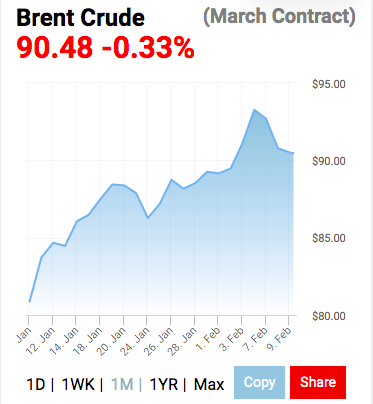Oil prices stall amid talks of Iran-US deal

Oil prices are hovering around $90 per barrel on both major benchmarks as the prospect of increased supply from Iran and the US weighed down prices and put pressure on the market.
Brent Crude prices have declined 0.34 per cent to $90.44 per barrel, while WTI has fallen 0.46 per cent to $88.95.
This follows sustained market rallies, with seven consecutive weeks of raised prices amid concerns of tightening supplies and rebounding demand, with key producers such as OPEC+ missing production targets.
However, an agreement could lift US sanctions on Iranian oil and quickly add supply to the market, with both sides engaged in talks this week to revive the 2015 nuclear deal.
However, a number of vital issues still need to be ironed out.
The US has reportedly restored some sanctions waivers, but Iran is demanding a full removal of sanctions and a White House guarantee of no further punitive steps.

Commenting on the slump in prices, Commerzbank analyst Carsten Fritsch said: “Speculation that Iranian oil exports could possibly return to the market in the foreseeable future has played a key part in this. If this were indeed to happen, the previous concerns about tight supply and dwindling spare capacities would be unfounded. After all, Iran could supply as much as 2 million additional barrels of crude oil per day to the market at short notice once sanctions are lifted. “
Craig Erlam senior market analyst at OANDA added: “WTI has slipped back below $90 but Brent is continuing to hold around there, after finding strong support over the last day or so. If US-Iran talks continue to progress, this level should come under some pressure, while a collapse of negotiations could be the catalyst that drives the price towards triple-figure territory.”
Market sentiment also took a hit from the latest monthly report from the Energy Information Administration, which raised its outlook for Us crude production to average 11.97m bpd this year.
There are also reduced fears in the market of supply shortages in Europe, as fears over a Russian invasion of Ukraine have not yet materialised in conflict.
French President Emmanuel Macron said yesterday that he believed steps could be taken to de-escalate the crisis after a meeting with Russian President Vladimir Putin and called on all sides to stay calm.
“The concerns about a further escalation of the Russia-Ukraine conflict appear to have eased somewhat following the latest diplomatic efforts, which is reducing the risk premium on the oil price,” added Fritsch.